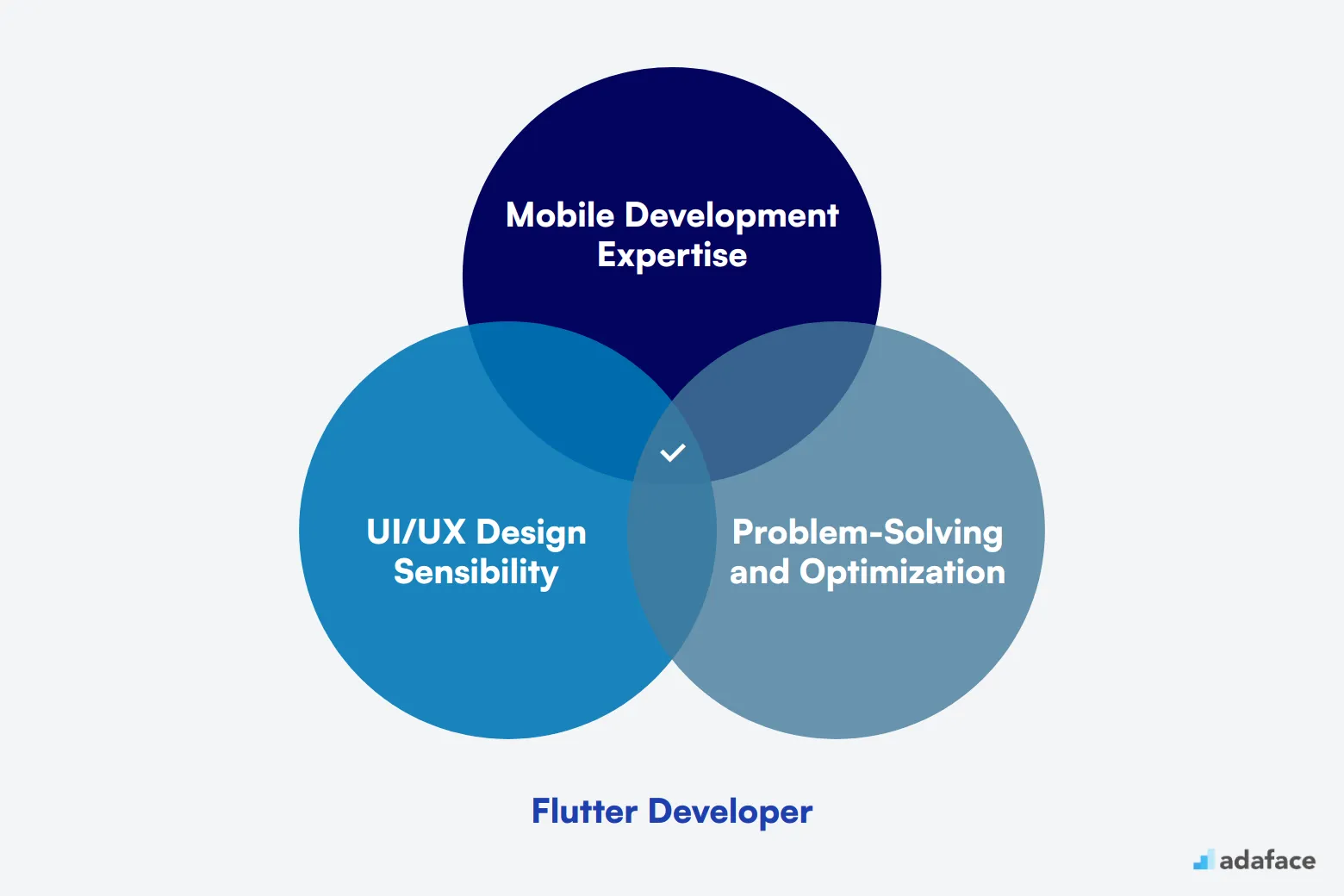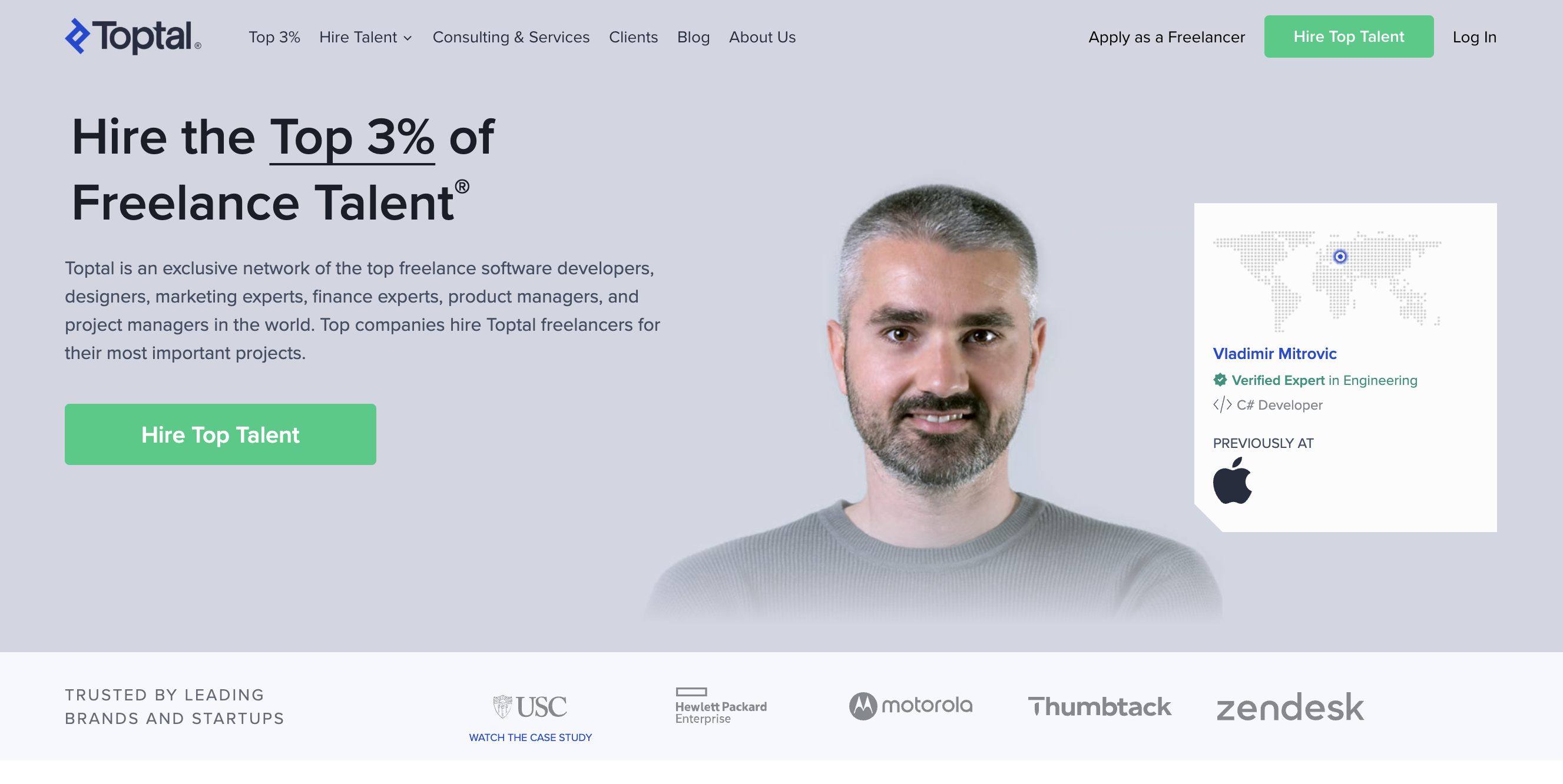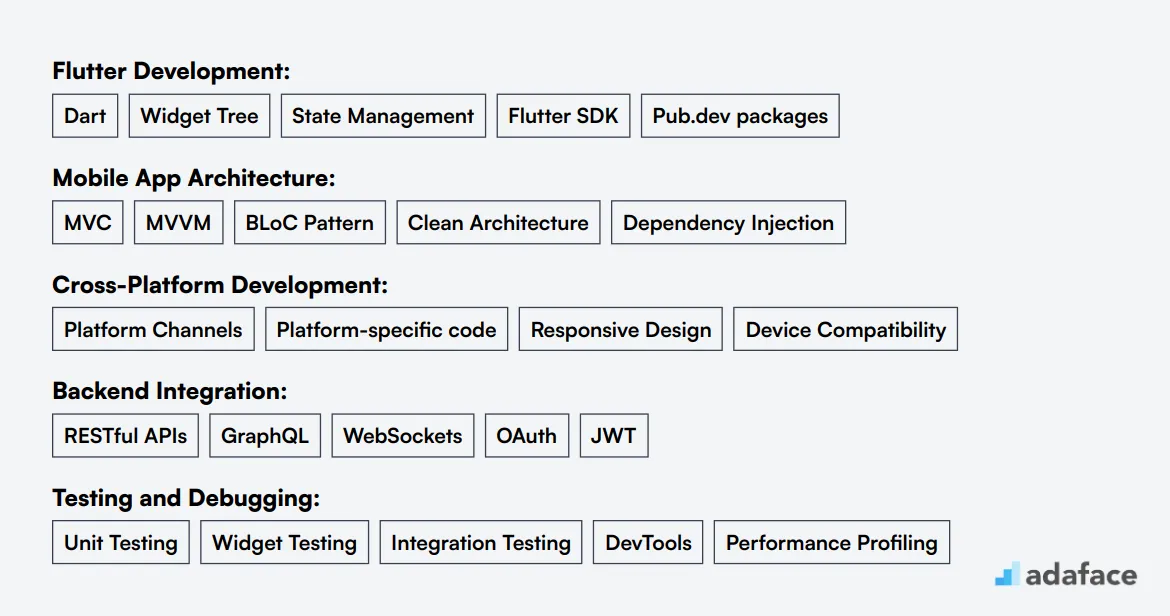In today's rapidly evolving tech world, hiring a skilled Flutter developer can give your company a competitive edge by delivering seamless cross-platform mobile applications. However, many recruiters struggle to identify and attract the right talent due to the unique skill set required for this role. A seasoned hiring manager knows the importance of understanding the specific demands of Flutter projects and matching them with candidates who have both the technical expertise and problem-solving prowess.
This article provides a comprehensive guide to hiring Flutter developers, outlining the hiring process, recommended skills, and platforms for sourcing candidates. To further enhance your recruitment process, explore our Flutter assessment test and make informed decisions.
Table of contents
Why Hire a Flutter Developer?
To determine if you need a Flutter developer, start by identifying mobile app challenges your business is facing. For example, you might need to create a cross-platform app that works seamlessly on both iOS and Android devices.
Consider these potential use cases for a Flutter developer:
- Developing a high-performance e-commerce app
- Creating a visually appealing social media platform
- Building a real-time messaging application
If you're unsure about committing to a full-time hire, consider starting with a Flutter developer skills assessment or working with a freelancer. As your project needs grow, you can then transition to hiring a dedicated Flutter developer for your team.

Flutter Developer Hiring Process
Hiring a Flutter developer typically takes about 1-2 months. Here's a quick overview of the process:
- Create and post a detailed Flutter developer job description
- Review resumes (expect initial applications within 3-4 days)
- Conduct skill assessments or coding tests (approximately 1 week)
- Interview shortlisted candidates
- Make an offer to the best candidate
The timeline can vary based on your recruitment speed and candidate availability. Let's dive deeper into each step to ensure you find the right Flutter developer for your team.
Key skills and qualifications for Flutter Developers
When hiring a Flutter Developer, it's important to distinguish between must-have skills and nice-to-have qualities. This distinction helps you focus on candidates who can hit the ground running while still leaving room for growth and specialization.
Required skills typically include proficiency in Dart, experience with the Flutter framework, and understanding of mobile app development cycles. Preferred qualifications might encompass knowledge of native Android or iOS development, UI/UX design principles, and familiarity with cloud services.
Remember, the ideal candidate profile can vary based on your project needs and team structure. Consider both technical expertise and soft skills like problem-solving and communication when evaluating potential hires.
| Required skills and qualifications | Preferred skills and qualifications |
|---|---|
| Proficiency in Dart programming language | Experience with native Android (Java/Kotlin) or iOS (Swift) development |
| Experience with Flutter framework and SDK | Understanding of UI/UX design principles |
| Understanding of mobile app development lifecycle | Knowledge of Firebase or other cloud services |
| Knowledge of state management in Flutter | Experience with version control systems (e.g., Git) |
| Familiarity with RESTful APIs and JSON | Familiarity with CI/CD pipelines |
Top Platforms to Source Flutter Developers
Now that you have a well-crafted job description, it's time to cast your net wide and find the right Flutter developer. Job listing sites are your go-to resource for sourcing candidates. Let's explore some of the best platforms where you can post your Flutter developer job and attract top talent.
Upwork
Ideal for hiring freelance Flutter developers for short-term projects or specific tasks.

Toptal
Best for finding top-tier freelance Flutter developers with rigorous vetting processes.

Useful for posting full-time positions and leveraging professional networks to find Flutter developers.

Other notable platforms include FlexJobs for remote roles, AngelList for startups, Glassdoor for highlighting company culture, Remote OK for exclusively remote positions, Hired for tech-specific roles, and Freelancer for various project sizes. Each platform caters to different hiring needs, so choose based on your specific requirements. Remember to use skills assessment tools to evaluate candidates effectively once you start receiving applications.
Keywords to Look for in Flutter Developer Resumes
Resume screening is a key step in finding the right Flutter developer. It helps you quickly identify candidates with the most relevant skills and experience before moving to the interview stage.

When manually screening resumes, focus on primary keywords like Dart, Flutter SDK, and mobile app development. Look for secondary skills such as state management, RESTful APIs, and UI/UX design principles. This approach helps you shortlist candidates who align closely with your requirements.
AI tools can streamline the resume screening process. You can use ChatGPT or similar AI assistants to analyze resumes based on specific keywords and criteria. This can save time and provide consistent evaluations across all applications.
Here's a sample prompt for AI-assisted resume screening:
TASK: Screen resumes for Flutter developer role
INPUT: Resumes
OUTPUT: For each resume, provide:
- Email and Name
- Matching keywords
- Score (out of 10)
- Recommendation
- Shortlist (Yes, No, or Maybe)
KEYWORDS:
- Dart
- Flutter SDK
- Mobile app development
- State management
- RESTful APIs
- UI/UX design
- [Firebase](https://www.adaface.com/assessment-test/firebase-test)
- Version control (Git)
- [Cross-platform development](https://www.adaface.com/blog/skills-required-for-flutter-developer/)
Recommended skills tests to screen Flutter Developers
Skills tests are a valuable tool in assessing the capabilities of Flutter developers, providing insights into their technical expertise beyond what's visible on their resume. These tests help ensure you find the right talent for building high-quality mobile applications.
Flutter Test: Utilize the Flutter Test to evaluate candidates on their proficiency in using the Flutter framework to create cross-platform applications. This helps verify their knowledge of Flutter-specific tools and widgets.
Dart Online Test: The Dart Online Test is crucial for assessing a candidate's understanding of Dart, the programming language behind Flutter. It's important to ensure they are comfortable with language features and can write clean, maintainable code.
UI/UX Design Test: A UI/UX Design Test can gauge a developer's ability to create intuitive and aesthetically pleasing user interfaces, which is a key aspect of mobile application development with Flutter.
Front-End Developer Test: With the Front-End Developer Test, you can assess a candidate's skills in building responsive and interactive user interfaces, ensuring they are capable of integrating Flutter with other front-end technologies.
Full Stack Developer Test: For a holistic understanding of a candidate's capabilities, the Full Stack Developer Test can be used. This test evaluates their ability to work on both client and server-side components, ensuring they can contribute to all aspects of app development.
Structuring the Interview Stage for Flutter Developer Candidates
After candidates pass the initial Flutter skills assessment, it's time for technical interviews. These interviews are key to evaluating a candidate's practical skills and problem-solving abilities. While skills tests help filter out unqualified applicants, technical interviews are crucial for identifying the best fit for your team.
Consider asking these Flutter-specific interview questions:
- How does Flutter differ from other cross-platform frameworks?
- Explain the widget tree and element tree in Flutter.
- What are stateless and stateful widgets?
- How do you manage state in Flutter applications?
- Describe your experience with Flutter's hot reload feature and its benefits in development.
These questions help assess the candidate's understanding of Flutter's core concepts, architecture, and development process.
What's the difference between a Flutter Developer and a Flutter Architect?
Flutter Developer and Flutter Architect roles are often mixed up, but they are quite distinct in their responsibilities and expertise. Both work with the Flutter framework, but their scopes and focuses differ significantly.
A Flutter Developer typically has 1-5 years of experience and focuses on implementing UI/UX features within an app. They make decisions at the implementation level, focusing on individual features or modules and component-level optimization. Their technical skills revolve around Dart and the Flutter SDK, and they mainly work as individual contributors with limited interaction outside their immediate team.
In contrast, a Flutter Architect has over 5 years of experience and is involved in higher-level decision-making regarding system design and architecture. This role requires a deep understanding of system architecture, and the architect is responsible for the entire application structure and application-wide optimization strategies. As technical leaders, they frequently interact with various departments, ensuring the app aligns with broader organizational goals.
For a more detailed look at the skills required for a Flutter Developer, you can explore our blog on required skills.
| Flutter Developer | Flutter Architect | |
|---|---|---|
| Experience Level | 1-5 years | 5+ years |
| Primary Focus | UI/UX implementation | System design and architecture |
| Technical Skills | Dart, Flutter SDK | Dart, Flutter SDK, system architecture |
| Project Scope | Individual features or modules | Entire application structure |
| Decision Making | Implementation-level decisions | High-level technical decisions |
| Team Role | Individual contributor | Technical leader |
| Performance Optimization | Component-level optimization | Application-wide optimization strategies |
| Stakeholder Interaction | Limited, mostly with immediate team | Frequent, with various departments |
What are the ranks of Flutter Developers?
Flutter developers often progress through various ranks as they gain experience and expertise. Understanding these ranks can help recruiters and hiring managers better assess candidates and align them with appropriate roles.
- Junior Flutter Developer: This entry-level position is for those new to Flutter development. They typically have basic knowledge of Dart and Flutter frameworks, and work on simpler tasks under supervision.
- Mid-level Flutter Developer: With 2-4 years of experience, mid-level developers can handle more complex projects independently. They have a solid understanding of state management and UI/UX principles in Flutter.
- Senior Flutter Developer: These developers have 5+ years of experience and deep knowledge of Flutter's advanced features. They often lead projects, mentor junior developers, and make architectural decisions.
- Flutter Architect: At the highest level, Flutter architects design large-scale applications, establish best practices, and oversee multiple projects. They often contribute to the Flutter community and may be involved in hiring and evaluating other Flutter developers.
- Flutter Team Lead/Manager: This role combines technical expertise with leadership skills. They manage teams of Flutter developers, coordinate with other departments, and ensure project delivery.
Hire the Best Flutter Developers
We've covered the essential skills, qualifications, and hiring process for Flutter developers. From understanding why to hire them, to sourcing platforms and key resume keywords, this guide aims to streamline your Flutter developer recruitment.
The key takeaway is to use well-crafted job descriptions and skills tests to make your hiring process more accurate. By focusing on both technical skills and soft skills, you'll be better equipped to find the right Flutter developer for your team.
Flutter & Dart Test
FAQs
A Flutter developer specializes in using the Flutter framework to build cross-platform mobile applications for both Android and iOS.
Key skills include proficiency in Dart, experience with Flutter framework, understanding of mobile app architecture, and strong problem-solving abilities.
Top platforms to find Flutter developers include job boards like LinkedIn, freelancing sites, specialized tech recruitment platforms, and attending tech conferences.
You can assess their skills using coding assessments, technical interviews, and reviewing their past projects and contributions to Flutter-related open-source projects.
A Flutter developer focuses on writing code and building applications, while a Flutter architect designs the overall architecture and ensures the app's scalability and performance.
A Flutter developer should have a degree in computer science or related fields, strong understanding of Dart, and experience with developing mobile applications using Flutter.
Some recommended interview questions focus on their experience with Flutter, problem-solving abilities, understanding of state management, and familiarity with app deployment processes.

40 min skill tests.
No trick questions.
Accurate shortlisting.
We make it easy for you to find the best candidates in your pipeline with a 40 min skills test.
Try for freeRelated posts
Free resources



